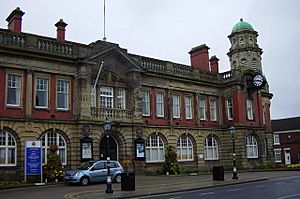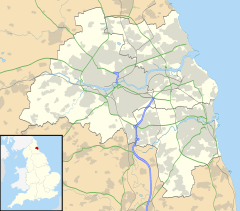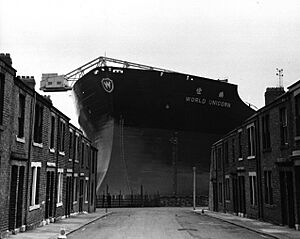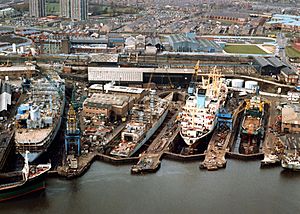Wallsend facts for kids
Quick facts for kids Wallsend |
|
|---|---|
 Wallsend Town Hall |
|
| Population | 43,826 |
| OS grid reference | NZ301664 |
| Metropolitan borough |
|
| Metropolitan county | |
| Region | |
| Country | England |
| Sovereign state | United Kingdom |
| Post town | WALLSEND |
| Postcode district | NE28 |
| Dialling code | 0191 |
| Police | Northumbria |
| Fire | Tyne and Wear |
| Ambulance | North East |
| EU Parliament | North East England |
| UK Parliament |
|
Wallsend (/ˌwɔːlzˈɛnd/) is a town in North Tyneside, Tyne and Wear, England. It is famous for being at the very eastern end of Hadrian's Wall. About 43,826 people live in Wallsend. The town is located about 6.5 kilometers (4 miles) east of Newcastle upon Tyne.
Contents
Wallsend's Story
Ancient Roman Wallsend
Long ago, during Roman times, Wallsend was the site of a fort called Segedunum. This fort was built to protect the eastern end of Hadrian's Wall. The wall didn't stop at the fort's western side. Instead, it continued from the fort's southeast corner all the way down to the River Tyne. People in the 1800s even saw parts of the wall's foundations reaching into the river.
Early History of Wallsend
After the Romans left Hadrian's Wall, groups like the Picts and Angles began to raid the area. The Angles sailed from near the River Elbe in Germany. In 547, a Saxon leader named Ida caused a lot of damage across the north. Wallsend likely suffered during this time.
Peace returned during the "golden age" of Northumberland. This was when King Edwin of Northumbria and later King Oswald of Northumbria (635-642) ruled. St Aidan also helped bring Christianity to the area. This peaceful time ended suddenly in 794 when many Danes, also known as Vikings, sailed up the Tyne River. For many years before the Norman conquest, the Danes and Angles fought for control of the land.
Wallsend from the 1800s to Today
In the late 1800s, Wallsend and nearby areas like Willington Quay and Howdon became organized districts. Wallsend officially became a municipal borough (a type of town government) in 1901. Later, in 1910, it grew bigger by including Willington Quay and parts of Longbenton.
St Peter's Church, Wallsend is a Church of England building. It has four beautiful stained glass windows made by Michael Healy. These windows show scenes like St Patrick, St Peter and St Luke (1913) and Our Lord with the Nativity and the Shepherds (1919). Another window by Ethel Rhind shows The Good Shepherd.
Shipbuilding in Wallsend
Wallsend has a long and important history of shipbuilding. It was home to the Wigham Richardson shipyard. This company later joined with another to become Swan Hunter & Wigham Richardson. This shipyard was famous for building the RMS Mauretania. This fast ship held the Blue Riband award for crossing the Atlantic in the shortest time for 22 years!
Other well-known ships built here include the RMS Carpathia. This ship rescued the people who survived the Titanic disaster in 1912. The icebreaker Krasin was also built here. It helped rescue the Umberto Nobile expedition in 1928.
In 1894, Charles Parsons launched his amazing ship, the Turbinia, here. This ship had a new type of engine called a steam turbine. It changed how navies around the world built their ships. Parsons also helped create affordable electricity for everyone. A BBC film called The Inventor of the Twentieth Century is about him.
A Russian writer named Yevgeny Zamyatin worked at Swan Hunter in 1916–17. He used his experiences there as a background for his famous book We. This book later influenced George Orwell's well-known novel Nineteen Eighty-Four.
During World War II, important ships like HMS Sheffield and HMS Victorious were built in Wallsend. These ships helped sink the Bismarck. The new HMS Ark Royal was also built here in the 1980s.
The main shipyard closed in 2007. The musical The Last Ship, created by the musician Sting, is set in this shipyard. Another part of the old shipyard, the Wallsend Slipway & Engineering Company, still works today. It builds offshore oil rigs and is even used as a TV studio! Shows like Vera and Inspector George Gently have been filmed there.
Coal Mining in Wallsend
Much of Wallsend's early growth came from coal mining. The Wallsend Colliery had seven different mines. These mines were active between 1778 and 1935. By the 1820s, the mines became part of Russell's Colliery. Later, it was called the Wallsend and Hebburn Coal Company Ltd. In 1924, the colliery employed 2,183 people. A very important manager there was John Buddle, who helped create the Davy Lamp. This lamp made mining much safer.
Between 1767 and 1925, there were 11 big accidents at the colliery. More than 209 miners died in these events. On June 18, 1835, a gas explosion in one of the tunnels killed 102 miners. The youngest was only eight years old, and the oldest was 75. Many of the miners were found with their cloth caps in their mouths. They likely did this to try and stop breathing in the deadly gas. The bodies were taken out and buried in St Peter's churchyard. A special plaque there remembers this sad event.
Wallsend in the 1900s
Wallsend has grown a lot since World War II, with many new houses built. The main shopping area, called the "Wallsend Forum," is in the western part of the town. North of this area are older neighborhoods like High Farm and newer ones like Hadrian Lodge.
The Wallsend Burn, a stream, separates the town center from the eastern areas. To the east of the Burn is Holy Cross, which has the remains of an old church. There are also neighborhoods like Rosehill and Howdon. South of Howdon is Willington Quay, which used to be a shipping area. Now, it has many factories and homes.
The main street for shopping is the High Street. North of this street is Wallsend Green. This is a pretty area with large houses and the Sir G B Hunter Memorial Hospital. Behind the Green is Wallsend Park. This is a traditional park that local people want to see improved. Plans include a skate and BMX park, better paths, and fixing the Duffy Memorial Fountain. Wallsend also has Centurion Park Golf Club, which has 18 holes and a driving range.
Wallsend is home to the Wallsend Boys Club. This club has helped train many famous football players. Some of them include Alan Shearer, Lee Clark, Steve Watson, Peter Beardsley, Robbie Elliott, Mick Tait, and Michael Carrick. The famous musician Sting was also born in Wallsend. His song All This Time mentions the Roman wall and fort.
Wallsend Town Hall is a large, grand building on High Street East. It was finished in 1908.
Remembering Roman History
To honor its Roman past, Wallsend uses its historic Roman name, Segedunum, in many places. You can also find signs with Latin words. For example, Wallsend Metro Station has signs in both English and Latin. These signs can be fun, showing how different things are today compared to ancient times. The Segedunum Roman Fort Museum teaches about Roman history. It also has rebuilt parts of a Roman bath house and a section of the Roman Wall.
Transportation in Wallsend
Wallsend has good transport links, helping people travel around the town and to other places in Tyne and Wear.
Wallsend's Population
In 2011, Wallsend had a population of 43,826 people. This was a small increase from the previous count of 42,842.
| Wallsend | North Tyneside | |
|---|---|---|
| White British | 95.1% | 95.1% |
| Asian | 1.9% | 1.9% |
| Black | 0.6% | 0.4% |
| Sources: | ||
About 4.9% of the people in Wallsend are from non-white British backgrounds. This is the same percentage as the wider area of North Tyneside. Wallsend has the same percentage of Asian people as the borough. It has slightly more Black people compared to the borough average.
Famous People from Wallsend
Many talented people have come from Wallsend.
Artists and Thinkers
- Paul W. S. Anderson - filmmaker
- Andrea Riseborough - actress
- Dr. Sheldon Hall - film historian
- Peter Higgs - theoretical physicist, winner of the Nobel Prize in Physics
- Paul Kennedy - historian
- Andrew Leslie - shipbuilder
- John Anthony McGuckin - theologian
- Vicky Pattison - reality TV star
- Charlie Hardwick - actress
- Danny Murphy - actor
- Janet McTeer - actress
Musicians
- Richard Gaddes - opera administrator
- Ray Jackson - musician
- Ochre - musician
- Venom - band
- Sting - musician
Football Players and Coaches
- Steve Bruce
- Brian Laws
- Michael Carrick
- George Reay
- Lee Clark
- Neil McDonald
- Tony Lowery
- Steve Watson
- Paul Stephenson
- Michael Smith
- Barry Richardson
Other Sports Stars
- Billy Bolt - motorcycle rider, FIM SuperEnduro World Championship winner
- Kevin McDine - darts player
- Chris Thorman - Rugby league player
- Jocky Wilson - darts player
- Gary Wilson - snooker player
 | Laphonza Butler |
 | Daisy Bates |
 | Elizabeth Piper Ensley |







